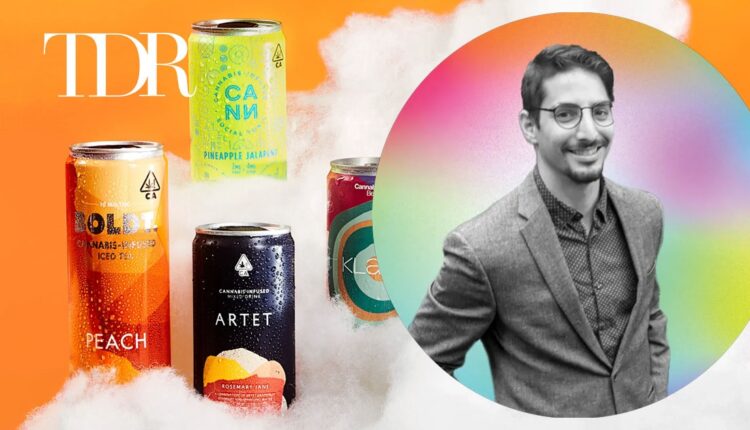
Cantrip CEO Adam Terry on the Future of Cannabis Beverages
The TDR Three Key Takeaways regarding Cantrip and Cannabis Beverages:
- Cantrip CEO Adam Terry discusses his transition from chemist to cannabis entrepreneur on TDR.
- Terry explained Cantrip’s change to hemp-derived beverages was a strategic step influenced by regulatory and economic factors.
- Consumer demand for cannabis beverages is growing, especially in Minnesota, where THC drinks are a major part of liquor store sales.
In the exclusive interview on “Trade to Black” podcast last Monday, Adam Terry discusses Cantrip’s strategic direction, the challenges of the cannabis regulatory changes, and the promising future of cannabis and hemp-derived beverages.
Adam Terry’s transition from a chemist to a cannabis entrepreneur underscores the diverse opportunities within the cannabis sector. Terry, who holds a degree in chemical engineering from UMass, began his career in the cannabis industry in California before moving back to Massachusetts. His extensive experience in extraction and product development laid the groundwork for Cantrip, which he founded in 2020.
“I went into the cannabis industry right away. I worked with extracts, concentrates, edibles—pretty much everything downstream of the plant itself was my job,” Terry explains. This comprehensive background equipped him to innovate within the cannabis beverage market, launching Cantrip in 2020 and focusing initially on dispensary sales.
Cantrip’s change to hemp-derived beverages was a strategic step influenced by regulatory and economic factors. The decision to expand into the hemp sector came after Minnesota passed a hemp-derived bill in 2022. This shift allowed Cantrip to scale more efficiently and affordably, leveraging traditional beverage distribution channels. “The reason we pivoted to hemp-derived was it was not an all-at-once type of thing. We saw this as our first opportunity to be able to afford to expand into another state in a way that seemed like it had traditional beverage economics,” Terry explains. This strategic change was crucial for Cantrip’s growth and market penetration.
One of the most significant challenges Cantrip faces is the complex regulatory environment. Traditional cannabis products are heavily regulated, resulting in long cash cycles and high operational costs. In contrast, hemp-derived products offer a different regulatory framework, enabling Cantrip to operate more like a traditional beverage company. “There’s a lot of differences. We essentially operate now like a traditional beverage company where we manufacture a product with a co-packer, we own that inventory, and we fulfill it to distributors,” says Terry.
Consumer demand for cannabis beverages is on the rise, particularly in markets like Minnesota, where THC beverages account for a significant portion of sales in liquor stores. This trend contrasts sharply with dispensaries, where beverages remain a niche product. Cantrip’s success in these markets highlights a growing acceptance and normalization of cannabis through familiar consumption methods. “The velocity is kind of crazy. In a liquor store in, say, Minnesota, you can see as much as 18% go out the door as THC beverage. It is kind of insane what the proportion is here,” Terry notes. This strong consumer demand underscores the potential for further growth in the hemp-derived beverage market.
Despite the progress, the cannabis beverage market faces ongoing challenges, including marketing restrictions and logistical hurdles. The future may involve potential acquisitions by larger beverage or alcohol companies, leveraging their expertise in distribution and market penetration. Terry highlights the competitive advantage of quality control, stating, “I went through extreme pains to find a source that I could trust that was actually getting the stuff from the plant that could provide me the farm certificates and the COAs of not only the biomass going in from the multiple farms, but also the crude extract that was made, the distillate that resulted from the chromatography and distillation processes, and then the emulsion.”
“I ended up running a sub stack post that goes into a lot of this. My job has become a constant game of paying a lot of attention to state houses,” Terry reflects. This focus on regulatory vigilance is essential as the industry navigates the changing legal scenario of the industry.
Anthony Varrell, co-host of the podcast ”Trade to Black”, also underscores the broader implications of these developments, noting, “It’s to pin people like me against Adam in a hemp versus cannabis debate and sit there and DeSantis gets to just sit back and enjoy the spoils of what’s going to happen. He places that article. He vetoes the bill. He then hopes that the hemp industry players in Florida will stifle three without him having to say anything or spend a dollar.” This commentary highlights the political complexities that the cannabis industry must navigate. Varrell adds, “I mean, we’re going to have to reverse engineer this thing to be more analogous with alcohol and freer moving forward for everything to actually work long term.” Want to be updated on all things Psychedelic, Cannabis, AI, and Crypto? Subscribe to our Daily Baked in Newsletter!



